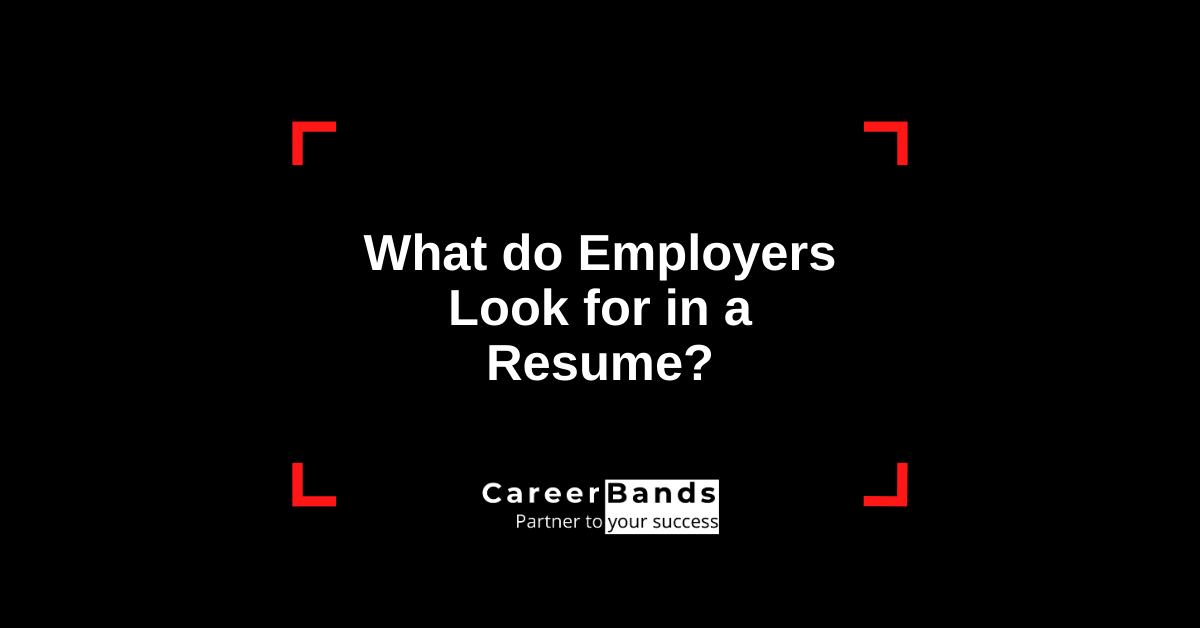Résumé is a lead-in document, the first introduction to your potential employer. On average, each job offer pulls in 250 resumes, and only 4-6 candidates are picked for an interview. So why not spend enough time and effort to produce a resume promising worth of being in those 4-6 people! An outstanding resume does not call for filling those dated headings! However, a successful resume is one that expresses that you meet the recruiter’s expectations. Also, it should be easily read and understood.
What do Employers Look for in a Resume
Let us now look at some things an employer looks for in a resume. With these tips in mind, we are sure that you will bring out an incredible resume.
Summary Statement
Here you can showcase your well-built assets straight away. Starting your resume with a summary statement instead of an objective highlights your passion to deliver instead of putting “what I want from you” in the spotlight!
When you are writing a summary statement, besides including the professional qualifications, briefly inform how you added value to transform your previous organizations. It would then be your earliest intro sent out, to the hiring manager, at a glance!
Relevant Resume
By this time, I am assuming that you know already not to copy-paste those already written resumes! Tailor your resume to each job you apply for. Your resume must be relevant and exhibit a coherent story.
How come a resume becomes relevant? Well, read the job offer a couple of times, and highlight apposite keywords. Answer how you would be a good fit for their requirements. Include relevant skills. You can also research what a company anticipates in that particular job position. Thus, you will end up including relevant skills and keywords!
Be Consistent and Clear
A good resume is consistent and clear. Ensure your résume is as coherent as possible. The included achievements and responsibilities should also be free from inconsistencies. Employers are not allergic to reading the applications, but they are short of time. They love it when they see the endeavor, the potential candidate has put, which enables them to read through your document easily!
How a resume can be made more consistent and clearer? Well, no need to worry! Just take care of these three to four things (pay heed to, what on the resume would cause you to immediately eliminate this applicant). And Voila, a consistent resume would be put together! Consider adding only those jobs which are most relevant to the Job Offer you are applying to (omit to add your decade-old jobs and internships). Like a good book, be sure that your resume follows the same format (i.e. font, heading size, italics, underline, etc.) throughout. Adjust the spacing so that your resume is easy to follow. Use bullet points where you want positive attention from the reader (except for including EVERYTHING in the bullets).
Finally, the experience and accomplishments you cover should correlate with the job you want! The more you are clear in your head-more are the more chances to induce clarity in your resume.
Career Background
Your resume could be skimmed to determine whether or not you have worked in a similar job position. A company favors a candidate more if he/she already has the relevant experience/ career background obviously (In a word, a restaurant wants a chef and not a gym instructor). So, instead of putting it all on one plate – try to mention the most relevant experiences in the career background and show how you were able to add value to them!
Outcomes and Achievements
Managers and Bosses love to see the results ain’t they? Do not forget to include how you overachieved a target in your previous job! Listing achievements (especially quantifiable) in your application aids you positive attention particularly when other applicants have forgotten to do so.
First, what sort of accomplishments are worth mentioning (and what are not)! What an employer looks for in a resume?
Second, you should know how to frame your achievements (in the most effective manner).
Third and Last, Where to disclose the achievements in your resume.
- Your achievements are not the day-to-day job duties. Personal achievements (like winning a debate competition or being a campus ambassador) can be included if you are a fresh graduate. Later on, these personal achievements become irrelevant and old.
- “Increases sales volume by 10%” or “Increased consumer engagement by 30% in three months” are some wonderful achievements to list. However, accomplishments like “Increasing existing customer loyalty” or “Implemented a time and money-saving process in an organization” are also fine. If you won an award, elaborate on why you won rather than just mentioning it in a one-liner.
- Don’t hesitate to add a fair number of outcomes and achievements (if you have). Undoubtedly, the achievement section is mentioned to stand out from the crowd. However, too much exaggeration is just like a boasting/ shouting person, so avoid that. Prioritize your list and keep it short.
- Mention your substantial accomplishments (preferably professional) in the resume’s summary statement (since it is the first portion a hiring manager goes through). Make a separate heading and use bullet points (ensure your bullets are not too stuffed). You can also chop your achievements into appropriate sections (academic, professional, personal, etc.)
References List
A resume references list is a contact, a hiring manager might touch to know more about you, your job performance, and your professional history. Remember to start with the most prominent references. There are two leading views regarding adding this list. One viewpoint says that there is no need to add one to your resume (for it is such an initial stage of the application and can be given later when called for an interview). Others agree to include a references list as a separate page attached to your resume. If you plan on adding one, it is better to follow this professional format:
Jeff AK (Reference Name)
Financial Manager (Professional Title)
XYZ Company (Reference Company)
500 Kingston Rd. (Company Address)
Toronto, ON
111-989-4321 (Reference Contact)
abc@xyzcomapany.com (Reference Email)
Bear in mind not to add a reference’s personal address since it is personal information and non-essential in the document.
Format and Label
What if you are a perfect fit for the position, but lack the conveying ability (who would know Tom is a good writer if he spends all his life hidden). Hence, unlock and declare your relevant skills in a perfect and easy-to-read format. Document your resume in a suitable arrangement (pick a nice and readable font, use black and sometimes dark blue in the text) and label the file with your name and potential position (Ali, David – Resume – Job Title).
Tip: Keep your application condensed to 1MB to evade storage issues for the reader.
All in all, this is the professional document that might secure you a job (or a job interview initially). Be confident, trust yourself, write your resume, and read it a couple of times. Write it with a mindset of what employers are looking for in your resume. (Diamond Tip) Don’t mind asking your friend/ elder sibling to read it for you and share his thoughts. You can later edit those things. Avoid choosing tiny fonts, copy-paste web resumes, and take the help of synonyms for keeping away from repetitive words (please be sure to skip those nerdy, overly fancy words)!
Pro Tip: Don’t hesitate to include your online presence (Twitter handle, LinkedIn Profile, or Personal Domain). It helps the reader to see you as a real person even if he does not check you on LinkedIn! It lends him an opportunity to be more familiar with you.
Follow these steps (we are happy to know that you knew many of them), take your time, and we are sure that you will finish making an outstanding resume for yourself. Good Luck!


